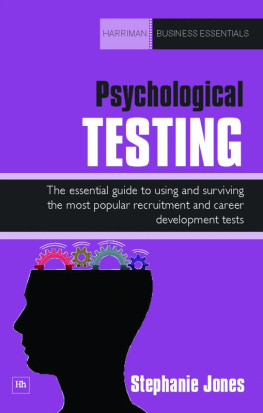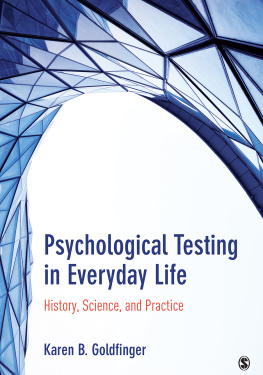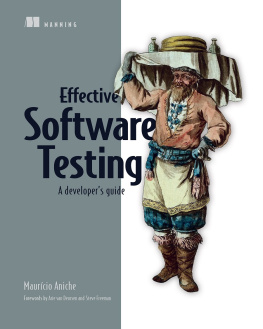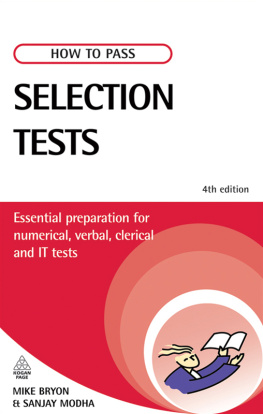Publishing details
HARRIMAN HOUSE LTD
3A Penns Road
Petersfield
Hampshire
GU32 2EW
GREAT BRITAIN
Tel: +44 (0)1730 233870
Fax: +44 (0)1730 233880
Email: enquiries@harriman-house.com
Website: www.harriman-house.com
The first edition, Psychological Testing for Managers, was published in Great Britain in 1993, second edition published in 2010. This eBook published 2011.
Copyright Harriman House Ltd
The right of Dr Stephanie Jones to be identified as author has been asserted in accordance with the Copyright, Design and Patents Acts 1988.
ISBN 13: 978-0-85719-110-6
British Library Cataloguing in Publication Data
A CIP catalogue record for this book can be obtained from the British Library.
All rights reserved; no part of this publication may be reproduced, stored in a retrieval system, or transmitted in any form or by any means, electronic, mechanical, photocopying, recording, or otherwise without the prior written permission of the Publisher. This book may not be lent, resold, hired out or otherwise disposed of by way of trade in any form of binding or cover other than that in which it is published without the prior written consent of the Publisher.
No responsibility for loss occasioned to any person or corporate body acting or refraining to act as a result of reading material in this book can be accepted by the Publisher or by the Author.
Many of the tests discussed in this book and mentioned by name are registered or unregistered trademarks, as detailed in the box below (denoted by for an unregistered trademark and for a registered trademark). In the books main text, trademark symbols have been omitted for ease of reading. Details of the tests trademarks and publishers are set forth, and further information on trademark and copyright requirements of the test publishers regarding these tests can be found on the websites of the applicable test companies.
16PF is a registered trademark of the Institute for Personality and Ability Testing, Inc (IPAT). IPAT is a wholly owned subsidiary of OPP Ltd.
FIRO-B is a registered trademark of CPP, Inc. OPP Ltd is licensed to use the trademark in Europe.
Fundamental Interpersonal Relations Orientation B is a trademark of CPP, Inc.
Introduction to Type is a registered trademark of the Myers-Briggs Type Indicator Trust. OPP Ltd is licensed to use the trademark in Europe.
MBTI, Myers-Briggs Type Indicator and Myers-Briggs are registered trademarks of the Myers-Briggs Type Indicator Trust. OPP Ltd is licensed to use the trademarks in Europe.
The TKI logo is a trademark of CPP, Inc.
Preface to the First Edition, 1993
The idea behind this book came from my work in researching and writing about various aspects of the corporate human resources world. Over the last few years I have looked in some detail at executive search and selection, interim management and outplacement, all of which make use of psychological testing as a tool to help match people to particular jobs and career opportunities. Psychological testing is increasingly common in the workplace. As a result, I wanted to find out more about it, especially about the different tests, how they are used and what they reveal.
However, all the books that I could find about occupational psychology, and psychological and psychometric testing, were written by professional psychologists, and seemed full of technical jargon and incomprehensible detail. These books were largely about models and theories of personality. They referred occasionally to specific tests, but without explaining what they were like, either from the point of view of the person being tested, or the user of tests.
If you knew you would have to undergo psychological tests in order to be selected for a job, or as part of an appraisal for promotion or transfer, wouldnt you want to know what the tests might entail? If you had not done a test before, you might feel at a disadvantage to someone who had.
Similarly, personnel managers or human resources directors without a background in psychology may be interested in using psychological tests, but have hesitated in the past through lack of knowledge. Many employers know very little about the range of tests available and depend either on second-hand recommendations or opt for the most commonly used tests without an awareness of the alternatives. Training courses are available but may be inconvenient, time-consuming or expensive.
I would like to emphasise that Psychological Testing for Managers is absolutely not the last word on the subject, but is an introduction for the non-psychologist, both as testee and user. It looks at a selection of the most commonly used tests in non-technical language and in a novel format, explaining what the tests involve, when they should be used, and how they can be combined with other tests to give a well-rounded picture of a potential employees strengths and weaknesses.
I have also tried to give the reader a feel for what it is like to do these tests. To achieve this, I have taken all the tests myself, and with some I have explained the nature of the feedback in terms of my own results. After the final test, I was told that I was suffering from test-overload, and that the value of doing any more was now limited so I would not recommend any individual to do more than a few tests in close succession.
One of my first experiences of professional writing more than 10 years ago was as a restaurant critic, and sometimes Ive jokingly referred to this book as The Egon Ronay Guide to Psychological Testing. I certainly hope it will introduce you to the variety and the benefits of psychological testing, whether you are a potential user of tests, or have or expect to have experience of them as a candidate for a job or promotion.
If Psychological Testing for Managers creates a feeling of familiarity with the concepts, banishes anxiety, allows for critical comparison and provokes interest in the wider subject of occupational psychology, then this books goals will have been achieved.
Choosing the Psychological Tests for this Book
The tests examined here represent a variety of categories and approaches with a particular focus on intelligence and personality assessments. Among the most established and respected are the Watson Glaser Critical Thinking test, Ravens Progressive Matrices, the Cattell 16PF and the Myers-Briggs Type Indicator. They are still widely used and have many long-term, loyal adherents. PAPI and OPQ are relatively recent developments, the latter created by SHL as a new range of tests for the management market, and must be welcomed as a major step forward in user-friendliness.
I selected these tests by talking to a number of occupational psychologists, and asking them which ones they thought were most commonly encountered. The tests included here are all widely available in the UK, the USA and parts of continental Europe. A number of them, especially the OPQ and PAPI, have also been translated into foreign languages. If you think that an especially important or useful test has been left out, please write to me and tell me about it.
Dr Stephanie Jones
Covent Garden, London, 1993
Preface to the Second Edition, 2010
Despite the changes in almost every aspect of life as we know it over the last fifteen years, I was pleasantly surprised at how much of Psychological Testing for Managers (this books original title) still seemed to be fresh and contemporary. We have even just been through another recession! The most popular psychological tests are still commonly used, but everything is now online. With this new edition, prompted by Louise Hinchen of Harriman House, I have had the exciting opportunity to bring new tests, and new versions of old tests, to a new generation of human resources managers (personnel is another relic of the 1980s and 1990s), job seekers and other interested parties. Enjoy! (I dont think we said that fifteen years ago, either.)













